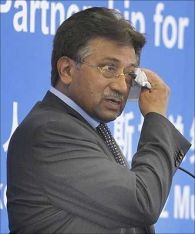 An anti-terrorism court in Pakistan has issued a non-bailable arrest warrant against former military ruler Pervez Musharraf for his failure to appear before the court in the 2007 judges’ detention case.
An anti-terrorism court in Pakistan has issued a non-bailable arrest warrant against former military ruler Pervez Musharraf for his failure to appear before the court in the 2007 judges’ detention case.
Musharraf, who last month flew to Dubai for purported treatment after the Supreme Court lifted bars on his foreign trips, was not present at the anti-terrorism court.
ATC judge Sohail Ikram expressed displeasure at absence of Musharraf and said he should have sought permission from the court before proceeding abroad, while hearing the case against Musharraf for allegedly putting the judges of the superior courts under detention after imposing emergency in 2007.
The court was not satisfied at the argument of his lawyer Akhtar Shah that Musharraf went out of the country after he was allowed by the government. It also rejected contention of state prosecutor Amir Nadeem Tabish that government allowed Musharraf to leave after orders of the Supreme Court.
Later, the ATC judge issued a non-bailable arrest warrant against Musharraf.
However, it is highly unlikely that the orders will be executed as several times in the past various courts issued orders to produce Musharraf but he easily dodged such orders citing security and health reasons.
The same court had issued such an order in September last year but withdrew when Musharraf refused to appear and instead sent a medical certificate that he was unwell.
It is believed that Musharraf enjoyed backing of army and despite several criminal cases, was allowed to go out of the country. Though, he has promised to come back and face all cases, it is highly unlikely that he would come anytime soon.
Musharraf ruled from 1999 to 2008 when he stepped down.
He lived abroad for most of the time until his return in 2013 to contest elections but was implicated in several high-profile cases and was not allowed to leave the country.
Musharraf had said before leaving that he was going abroad to seek medical treatment for a spinal cord ailment which has now developed several complications and will “come back in a few weeks or months”.
The ex-army chief is facing a slew of court cases after returning from five years of self-exile in Dubai.
He is facing trial in high treason case for abrogating the constitution in 2007 and illegal detention of judges same year. In January 2014, Musharraf suffered a “severe heart attack” on his way to a special court to face the high treason charges following which he was admitted to an army hospital.
Treason is punishable with death in Pakistan.
Musharraf has also been charged in connection with the 2007 assassination of prime minister Benazir Bhutto and the killing of a radical cleric in Islamabad in a military crackdown.











 © 2025
© 2025